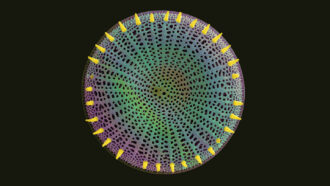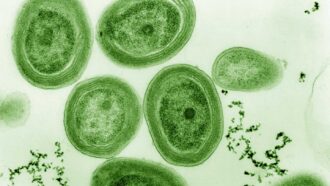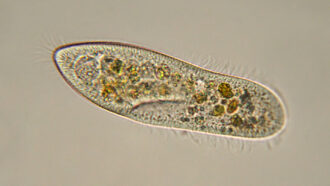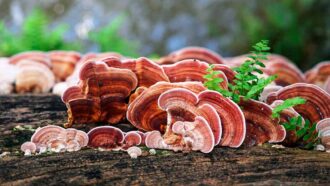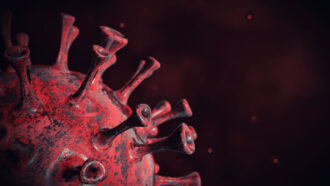Some microbial hitchhikers may weaken body’s attack on COVID-19
When the wrong bacteria dominate, the immune system may not do its job well
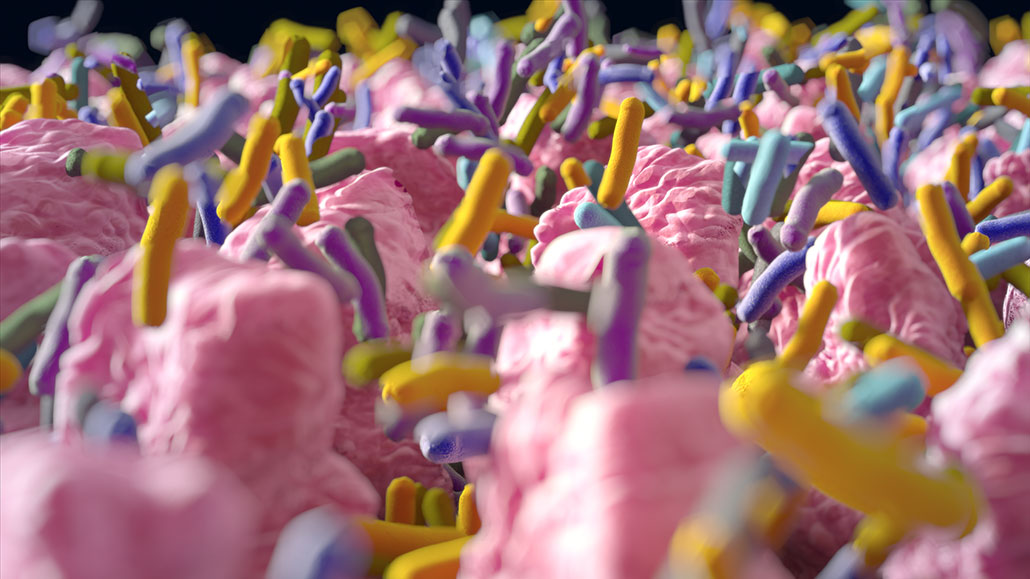
This artist’s rendering depicts hitchhiking bacteria (blue, purple, green and yellow rods) covering the surface of the villi — pink finger-like projections — of the gut’s inner wall. Some bacteria are beneficial. Others may make us sick. Diet, disease and more can determine which bacteria dominate and affect health.
ChrisChrisW/iStock/Getty Images Plus
An army of bacteria, fungi and other one-celled hitchhikers live in our guts. Some can cause disease. Many play helpful roles. Some help digest food, for instance. Others can fight off infections. As a microbiologist at the University of Massachusetts Medical School, in Worcester, I study those hitchhikers. And lately, our team has found altered patterns of these microbes in the gut and mouth that seem to impair the ability of our bodies to mount a good defense against COVID-19.
You may not know it, but you have trillions of microbes living inside of you. Together, they’re known as your microbiome (My-kroh-BY-ohm). Each microbe species performs specialized jobs. In the gut, the bacteria tend to keep that immune system healthy. They also balance how our immune system responds to harmful germs. They can keep attacks against germs from leading to friendly-fire that also harms us, their host.
Most people have a mix of good and bad microbes in and on their bodies. A large share of good ones tends to mean the bad ones won’t take over and do harm. We have now found that some people have too many of a few bad types of bacteria. At the same time, they have too few of several good ones.
Finding this pattern in someone sick with COVID-19 appears to predict with 96 percent accuracy who will go on to have severe disease. That’s what we describe in a paper posted online January 6 on medRxiv.
Our findings come from a small study. It included just 69 COVID-19 patients. These data have not yet been peer-reviewed. That’s when other experts look for potential problems in the study or how we analyzed its data. But if the pattern we report holds up, it would be very encouraging. It appears to be is the best marker to date of which people infected with the COVID-19 virus are at risk of getting severely ill.

Educators and Parents, Sign Up for The Cheat Sheet
Weekly updates to help you use Science News Explores in the learning environment
Thank you for signing up!
There was a problem signing you up.
Our good bacteria vary with diet, disease and more
Many bacteria in our microbiome are great companions. But their mix can change as a result of diet, disease — even medicines.
Antibiotics, for instance, are designed to kill bacteria. But often they take out the good ones along with the bad. One important study in 2011 found that the immune system didn’t work well in mice treated with antibiotics that had killed off good gut bacteria. These animals had low counts of virus-fighting white blood cells. They didn’t produce many infection-fighting proteins known as antibodies. They also didn’t make enough of certain proteins that are vital for attacking viruses and keeping the immune response from dangerously going into overdrive.
A 2017 study fed mice a type of good bacteria that are found in some fermented foods (such as yogurt). Then researchers exposed the mice to the flu virus. Compared to untreated mice, those getting the bacterial treatment were less likely to become infected. They also had less lung inflammation. And their bodies were faster at getting rid of the flu virus.
Such studies show that boosting our microbiomes with good bacteria can help fight disease. But it’s possible that too many bad bacteria can harm our immune systems. My lab wanted to hunt for microbes that might signal risks or benefits in people exposed to life-threatening infections.
Both disease and what we eat affect which microbes thrive in our microbiomes. My lab has been using different foods to show how diet can be used as a therapy for certain chronic diseases. Chronic diseases are ones that last a long time or may never go away.
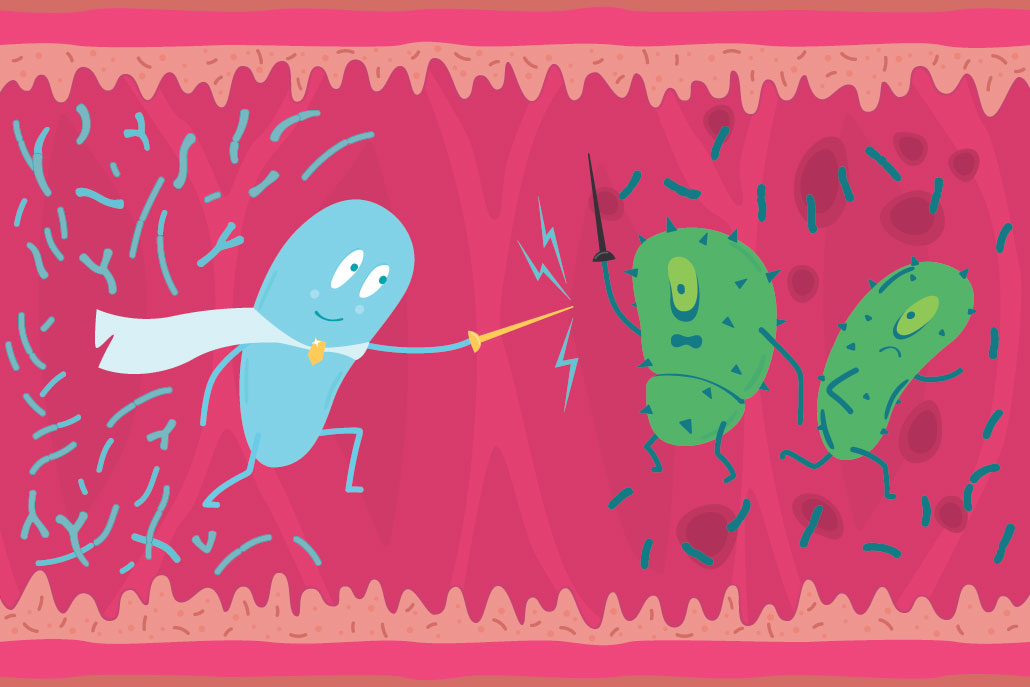
More recently, we’ve begun looking at patients with COVID-19. SARS-CoV-2 is the virus that causes this disease. Roughly one in five of these patients will get sick enough that they must go to the hospital for treatment in intensive care units.
What do many of those really sick patients have in common? Most are over 65. Most also have chronic diet-related diseases. Such diseases include obesity, type-2 diabetes and heart disease. Both Black and Latinx patients suffer from higher rates of all three of these diseases than do whites. Many people in their communities also tend to eat fewer nutritious foods. Not surprisingly, both Black and Latinx patients have suffered more deaths from COVID-19 than have white patients.
This has inspired me to shift the focus of my research onto the role of the gut microbiome in the body’s overly aggressive immune response to SARS-CoV-2. My team hypothesized that the microbiome is different in COVID-19 patients who suffer from obesity, diabetes or heart disease. We also suspected that this altered mix of microbes aggravates something we call acute respiratory distress syndrome, or ARDS.
ARDS is a life-threatening lung injury. For COVID-19 patients, it is thought to stem from a potentially fatal overreaction of the immune response. It’s called a cytokine (SY-toh-kine) storm. Cytokines are a group of signaling molecules. They tell the body’s immune system when to turn on inflammation and other processes (such as the production of new blood cells).
A cytokine storm can trigger an uncontrolled flood of immune cells into the lungs. In affected patients, their body may attack itself rather than the virus. The result could be severe lung injury and organ failure — even death.
The role of gut microbes
Several studies have shown patients with severe COVID-19 tend to have unhealthy communities of gut microbes. To date, however, no one has identified specific gut bacteria (or patterns of them) that predict how sick they may get.
My team has now started to do this. We recruited hospitalized COVID-19 patients. All had moderate to severe symptoms. We collected saliva and stool samples from each. From these, we now report an unusual pattern.
Two species of bacteria are present in far higher numbers than we usually see in healthy people. Two species show up in far lower numbers. If follow-up studies confirm this trend, testing a COVID-19 patient’s microbiome could prove key to knowing who will need the most critical care.
To identify bacteria living in the gut, we analyzed poop. After all, that’s where many microbes exit the body after being shoved out as food rubs against them in the intestines. Enterococcus faecalis (En-tur-oh-KOK-us FEE-kah-lis) was one bacterium whose numbers were unusually high in poop.
This microbe is often linked with chronic inflammation. Once extracted from feces, this microbe can be grown in the lab. Thus, testing COVID-19 patients for this germ might be cost-effective, rapid and relatively easy.
A second microbe also was present at unusually high levels, this time on the tongue. It, too, has a long name: Porphyromonas endodontalis (POR-feer-oh-MOH-nus En-do-DON-tuh-lis). It’s a germ that can lead to gum disease.
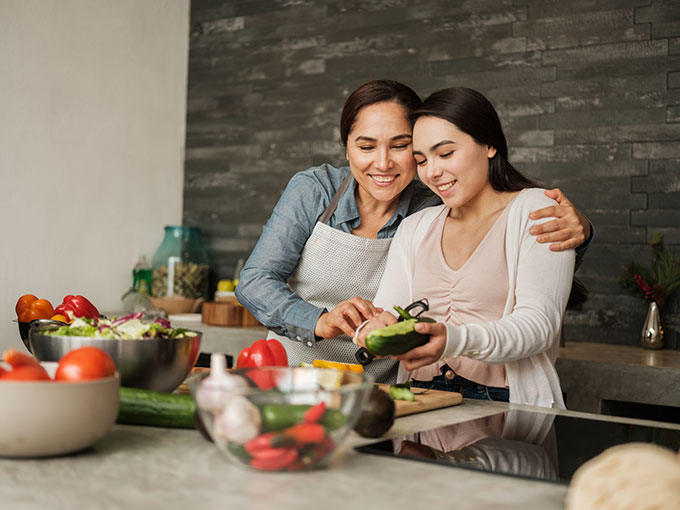
Our research does not yet show why these microbes might affect how the body responds to SARS-CoV-2. One December 15, 2020 study showed that SARS-CoV-2 infection triggers an imbalance in immune cells. Known as T regulatory cells, these are critical to keeping the immune system from going into overdrive.
Gut bacteria are responsible for properly turning on those T-regulatory cells. Thus, researchers like me need to repeatedly sample poop, saliva and blood in sick patients. In that way, we hope to learn how the altered microbiome seen in COVID-19 patients might link to how sick people get, perhaps by altering the development of those T cells.
Access to good foods can lead to a healthier microbiome. As a Latina scientist investigating links between diet, microbiomes and immunity, I must stress the importance of better policies to improve access to low-cost but nutritious foods. It also is important to make dietary recommendations for Black and Latinx communities that include the foods that also reflect their heritage.
While a good-quality diet might not prevent SARS-CoV-2 infection, it may treat the underlying conditions that could make COVID-19 more severe.
This article has been adapted with Ana Maldonado-Contreras’ help from a piece this microbiologist wrote for The Conversation.
